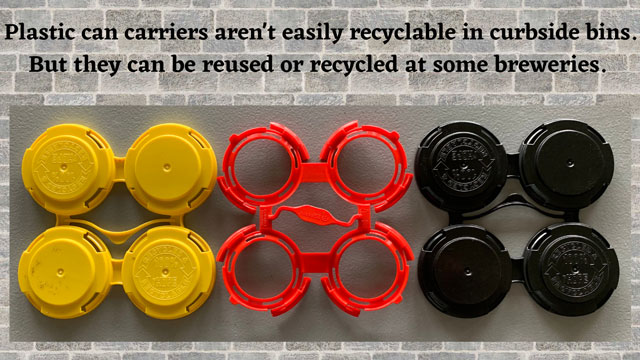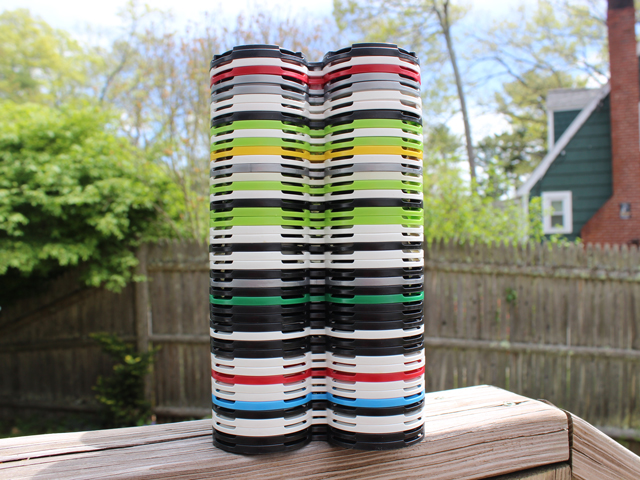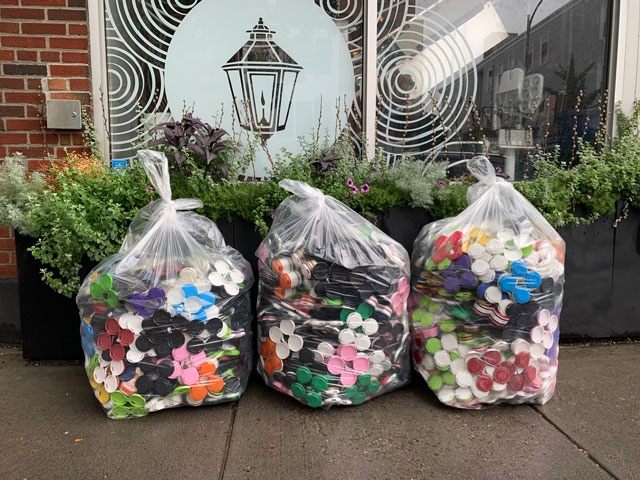An Interview With The Eco-Friendly Beer Drinker
We recently caught up with Mass. Brew Bro and Eco-Friendly Beer Drinker, Rob Vandenabeele to learn more about his quest to help not only the Craft Beer Industry become more sustainable, but educate consumers on how they can aid in the process.
Written by CraftJack | Updated | 4 min read
Interesting Tools
- Beer BrüMate Hopsulator
- Brewing Northern Brewer Beer Making Kit
- Spirit Crystal Whiskey Glasses
- Wine Wine Decanter/Aerator

The Interview
FMaB: Tell us about yourself and Mass. Brew Bros, the project that kicked this journey off. Word has it that you set out to visit every brewery in the Bay State - is that true? If so, do you keep up with all new openings?
Eco-Friendly Beer Drinker: Mass. Brew Bros. is a passion project that started back in 2014 when a friend and I were attending festivals and visiting breweries (the law allowing them to serve pints on-premise had just gone into effect) all over the state. While completing the Mass Brewers Guild passport program (there were less than 100 breweries at the time and many weren't open to the public - I think we earned 50 or so stamps for visiting every one that a patron could) we started a Twitter account and people seemed to like following our adventures and learning about the evolving Massachusetts craft beer scene.
We figured we were onto something so opened Facebook and Instagram accounts and launched the website early in 2015. The other Brew Bro has kept up ever since, visiting an astonishing 200 or so breweries in 2021. To state the obvious, the craft beer scene has really taken off since then and It's been a fun ride.

FMaB: What about Eco-Friendly Beer, can you expand on that initiative that you're driving a bit more? What is it that Eco-Friendly Beer does? What inspired you to launch the initiative?
Eco-Friendly Beer Drinker: Eco-Friendly Beer came about as a result of my enrollment at the Harvard Extension School where I'm closing in on a graduate certificate in environmental sustainability. It's given me an opportunity to combine two of my greatest passions, craft beer and the environmental awakening that's taking place (hopefully not too late). Its goal is to provide insights on how the craft brewing industry and its consumers can be environmentally mindful of our Earth, the only planet with craft beer. 🌎🍻
FMaB: Do you brew beer? If so, commercially? Do you have any plans for opening up a brewery?
Eco-Friendly Beer Drinker: We're better at drinking beer than making it. Neither the Mass. Brew Bros. nor Eco-Friendly Beer do any serious brewing, other than collaboration beers like the one we did with Oakholm Brewing recently, and our upcoming National Pretzel Day beer collab with Dorchester Brewing next month. It's a delicious Dunkel brewed with Wicked Twisted Pretzels and a pinch of salt. There will be a release event at their taproom on or around April 26.
FMaB: What's your favorite type of beer? Do you have a favorite brewery?
Eco-Friendly Beer Drinker: As avid beer lovers, neither of us really has a favorite style, nor do we publicly praise specific breweries as the so-called "best" in the state. Our belief is that everyone should explore the world of beer. Our advice is for people to forget the ratings and find out what they like on their own by trusting their own palate. There is more to love about craft beer than the latest IPA.
FMaB: If you could only have one more beer in your life, what would you choose?
Eco-Friendly Beer Drinker: All that said, If I could only have one beer for the rest of my life it would likely be something from Cambridge Brewing Company, my amazing hometown brewery.

FMaB: How can people do their part in becoming more Eco-Friendly? For example, you created a map of all of the locations that craft beer lovers can return their plastic 4 pack can carriers. Is there more that can be done?
Eco-Friendly Beer Drinker: For the last year I've been focussing most of my energy on the Plastic Can Carrier (PakTech) Reuse & Recycle Initiative. It came about as a result of my frustration over the plastic packaging that's prevalent in the craft beer industry. What especially spurred me on was the manufacturer's disingenuous marketing of its product as "100% recyclable", which may be true in theory but certainly isn't true in the real world of consumer recycling.
It's what environmentalists call "greenwashing", which is when a company spends more time and money on promotion than on actually minimizing their product's environmental impact. I'm proud to say that craft beer consumers in Massachusetts can find more than 100 take-back locations where breweries or beer stores will either reuse can carriers or arrange for them to be properly recycled through a special separate stream program in collaboration with GreenLabs Recycling.
The initiative has already been replicated in Vermont, Rhode Island, and is in the process of being adopted in Metro Chicago this spring.

FMaB: What's in store for the future of Eco-Friendly Beer?
Eco-Friendly Beer Drinker: In 2022, Eco-Friendly Beer is hoping to expand its efforts into some new initiatives, possibly as part of some EPA grant programs that would focus on helping the craft beverage industry reduce its environmental impact further with best practices regarding things like energy and water conservation, solid waste (especially single-use items) reduction, and improved recycling programs for troublesome materials.
FMaB: What about Compostable plastic cups? What are we supposed to do with those?
Eco-Friendly Beer Drinker: I'm glad you asked about so-called "compostable" cups, which I wrote about in an in-depth blog post you can read on EcoFriendlyBeer.com - Why That “Compostable” Plastic Cup Isn’t Good for the Environment Either. Long story short (for the long story read the blog post), they are not what the consumer believes they are and therefore part of the single-use consumption problem that permeates our consumer culture of "convenience first."
What needs to be emphasized is REDUCING our impact by Reusing items (including cups) and recycling (if and when we can) only as a last resort. My prediction is that a reuse revolution is coming.
FMaB: Speaking of breweries, can you toss out a few names that are shining examples of sustainability in the industry?
Eco-Friendly Beer Drinker: As for some of the "shining examples of sustainability" in the industry, this might not be a popular answer but a real one: brewing beer is an energy- and material-intensive process that is hard to make a sustainability argument for, especially as it scales up and relies more on retail sales of takeaway beer.
Nationally, New Belgium and Sierra Nevada have taken some pretty impressive measures to mitigate their environmental impact. Here in New England, Vermont's B Corporation brewery The Alchemist, which employs solar energy, carbon-capture technology, and a state-of-the-art wastewater treatment system, is about as good as it gets. Fellow B Corp Allagash Brewing is also notable, in particular for its reliance on local ingredients and its intensive recycling program.
From a consumer perspective, the best thing one can do is to frequent your local brewery. Think about it: there you can drink local, preferably draught beer, on-premise, and in proper reusable glassware. Cheers to more sustainable beers.
Follow Eco-Friendly Beer Drinker
Beyond https://ecofriendlybeer.com/, you can find the Eco-Friendly Beer Drinker on the social channels below.
